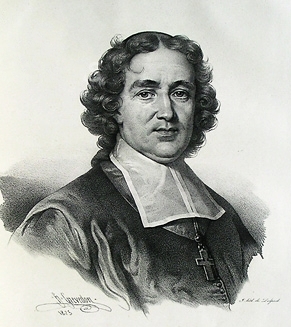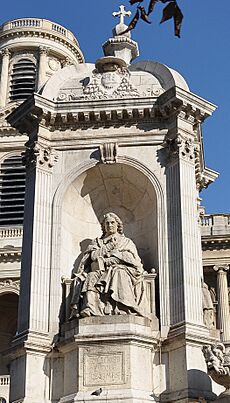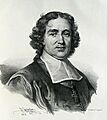Esprit Fléchier facts for kids
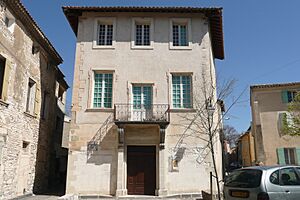
Esprit Fléchier (born June 10, 1632 – died February 16, 1710) was a famous French speaker and writer. He became the Bishop of Nîmes and served from 1687 until his death in 1710.
Contents
A Look at His Life
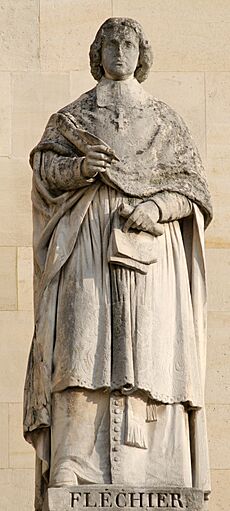
Esprit Fléchier was born in a town called Pernes-les-Fontaines, which is in a part of France known as Vaucluse today. Back then, it was called the Comtat Venaissin. His parents were Pierre-Michel Fléchier and Marguerite Audifret. He was baptized on June 19, 1632.
He first went to school in his hometown. Later, he attended a college in Tarascon. This school was run by a group of priests called the Congrégation des Doctrinaires. His uncle, Hercule Audiffret, was actually in charge of this group.
Joining the Doctrinaires
Fléchier joined the Congrégation des Doctrinaires as a new member in Avignon on August 25, 1647. He made his official promises to the group on August 30, 1648. When he was just 17, he started teaching subjects like history and literature. He taught for four years in Tarascon and Draguignan. After that, he moved to Narbonne, where he taught for six more years until 1659.
Moving to Paris
In 1659, Fléchier went to Paris to see his uncle, Hercule Audiffret, who was very ill. Sadly, his uncle passed away before he arrived. Around the end of 1659, Fléchier decided to leave the Doctrinaires. He found their rules too strict.
In Paris, he started writing poetry. His French poems weren't very popular. However, he wrote a poem in Latin about a special event called a "carrousel" (a type of tournament) that King Louis XIV held around 1662. This poem became very famous and brought him a lot of attention.
Working for Important People
Later, Fléchier became a tutor for a young man named Louis Urbain Lefebvre de Caumartin. This young man later became an important financial official and a royal advisor. Fléchier traveled with him to Clermont-Ferrand. Here, the king had ordered a special court session called the Grands Jours to be held. Caumartin was sent there to represent the king.
During this time, Fléchier wrote a fascinating book called Mémoires sur les Grand jours tenus à Clermont. In this book, he described the events of this special court. He mixed historical facts with a bit of storytelling, making it very interesting.
Becoming a Bishop
In 1668, a nobleman named the duke of Montausier helped Fléchier get a job as a reader for the Dauphin, who was the king's son. Fléchier's sermons, which are religious speeches, made him even more famous. His reputation grew even more because of his "funeral orations." These were powerful speeches given at the funerals of important people.
Some of his most famous funeral orations were for the duchesse de Montausier (in 1672), the duchesse d'Aiguillon (in 1675), and especially for Marshal Turenne (in 1676). Because of his talent, he was chosen to join the Académie française, which is a very important group that protects the French language.
The king liked Fléchier very much. He gave him important church positions, including the abbacy of Saint-Séverin-sur-Boutonne. He also became an almoner (a chaplain) to the Dauphine, the king's daughter-in-law. In 1685, he became the Bishop of Lavaur, and then in 1687, he was promoted to Bishop of Nîmes.
Dealing with Religious Differences
Two years before Fléchier became Bishop of Nîmes, the Edict of Nantes had been canceled. This meant that Calvinists (also known as Protestants) in France no longer had the same religious freedoms. Even though the Edict was gone, there were still many Calvinists in Nîmes.
Fléchier was known for being kind and understanding. He managed to convince some Calvinists to join the Catholic Church. He even earned the respect of those who chose to keep their Protestant faith.
During the difficult times of the Protestant troubles in the Cévennes, Fléchier tried his best to make the strict laws less harsh. He was very understanding, even towards people whose beliefs were different from his own. Because of this, Protestants in that area remembered him with great respect for a long time. He passed away in Montpellier.
Joining the Académie Française
Esprit Fléchier was chosen to be a member of the Académie française on December 5, 1672. He took the place of Antoine Godeau. He officially joined the Académie on January 12, 1673. On the same day, two other famous writers, Jean Racine and Jean Gallois, also joined.
His Writing Style
Fléchier was especially good at giving speeches from the pulpit (in church). While he wasn't as powerful as some other famous speakers like Bossuet, he was still very talented. He was always clever and often witty. He was also very good at making his words sound beautiful and rhythmic. Sometimes, he used too much symmetry and opposite ideas in his sentences, which could make them sound a bit forced.
His two history books, one about Theodosius I and another about Ximenes, are known more for their elegant writing style than for being perfectly accurate or having deep insights.
His Published Works
Fléchier wrote many books and speeches. Here are some of them:
- The Life of Cardinal Jean-François Commendon (1671)
- History of Theodosius the Great (1679)
- History of Cardinal Ximenes (1693)
- Panegyrics of Saints and Some Moral Sermons (1695)
- Letters of Mr. Flechier, Bishop of Nismes, on Various Subjects (1711)
- Selected Letters of Mr Fléchier, with an Account of the Fanatics of Vivarez and Reflections on the Different Characters of Men (2 volumes, 1715)
- Complete Works (10 volumes, 1782)
- Fléchier's Journey to Auvergne (1796)
- Funeral Orations (2 volumes, 1802)
- Complete Works of Fléchier, Classified for the First Time, According to Logical and Analogical Order (2 volumes, 1856)
- Fléchier's Memoirs on the Grands-Jours held in Clermont in 1665–1666 (first published in 1844)
Fléchier also wrote a description of himself, like a self-portrait in words, for one of his friends. His "Funeral Oration of Marshal Turenne" was translated into English in a book called History and Repository of Pulpit Eloquence.
Remembering Esprit Fléchier
There are streets named after Esprit Fléchier in several towns in France. These include Éleu-dit-Leauwette, Marseille, Paris, and Tarascon.
Images for kids
-
Birthplace of Esprit Fléchier in Pernes-les-Fontaines
-
Statue of Esprit Fléchier by François Lanno, in the Cour Napoléon of the Louvre.
 | Laphonza Butler |
 | Daisy Bates |
 | Elizabeth Piper Ensley |


